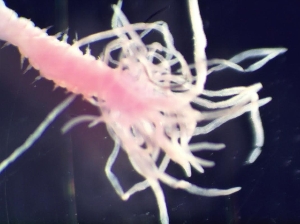- A group opportunity. Invite your friends.
-
2 people are interested
Hands On Sea Critters in Our Lab!
ORGANIZATION: Center for Coastal Studies
Please visit the new page to apply.
- A group opportunity. Invite your friends.
-
2 people are interested

This opportunity is for anyone who would like to contribute to greater marine ecosystem knowledge and enjoys communal but individually focused lab work. No specialized education is required, you will receive training! Preferred commitment is 2-3 hours per week in our lab in Provincetown.
Our benthic habitat mapping project includes taking biological samples, which are now ready to be identified in the lab. These samples have been taken from Herring Cove in Provincetown (Cape Cod National Seashore).
The samples are taken from bottom sediment, pre-sorted (flushing out the mud, large cobbles, etc.) on the boat, and preserved in a mix of ethanol and rose bengal (which stains proteins pink).
Under the direction of Project Leader Agnes Mittermayr, you will pick through the samples, which involves transferring scoops of sediment onto big white trays and picking out anything pink and animal-like. Volunteers will pre-ID the animals into categories like worms, amphipods, and mussels, after which they are put in ethanol to preserve them. Once the picking is over, Agnes will begin the identification process of each and every individual.
Specific ID involves knowledge of biology and anatomy of animals and requires hours and hours of training. If a volunteer wishes to invest more time in this project than your initial sorting will take, Agnes can train you to ID a single group of animals (like shellfish).
Once all the ID's are in we not only know exactly which species and how many individuals of each species we have living in the sediments along the Cape, we also can develop maps with biodiversity hot spots (among other things). This information will be fed into CMECS (the Coastal and Marine Ecological Classification Standard), which is a nationwide/federal tool to classify marine ecosystems. The information will help the Cape Cod National Seashore and the Cape's towns in developing and implementing a management plan.
Invertebrates are an essential part of the marine ecosystem, comprising part of the base of the food web and vital support for the biodiversity in Cape waters.
More opportunities with Center for Coastal Studies
1 ReviewNo additional volunteer opportunities at this time.
About Center for Coastal Studies
Location:
115 BRADFORD ST, PROVINCETOWN, MA 02657, US
Mission Statement
To conduct scientific research with emphasis on marine mammals of the western North Atlantic and on the coastal and marine habitats and resources of the Gulf of Maine;
To promote stewardship of coastal and marine ecosystems;
To conduct educational activities and to provide educational resources that encourage the responsible use and conservation of coastal and marine ecosystems.
Description
We are an independent, non-profit organization dedicated to the study and conservation of marine wildlife, habitats and ecosystems. We are internationally known for our endangered whale research and rescue programs. Other priority areas include marine geology, coastal and estuarine studies and marine fisheries. Our work has contributed to science, resource management, policy and public awareness since 1976.
CAUSE AREAS
WHEN
WHERE
5 Holway AvenueProvincetownProvincetown, MA 02657
DATE POSTED
March 21, 2019
SKILLS
GOOD FOR
- People 55+
- Group
REQUIREMENTS
- Must be at least 18
- 2-3 hours per week
- An ability to concentrate for several hours at a time and attention to detail
